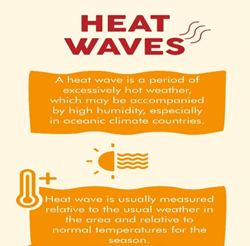

21st July 2023 (7 Topics)
Context
Europe is experiencing scorching temperature that rose to an unprecedented level in the couple of days recently, accompanied by extreme heat waves.
Heat waves and standards:
Several countries have adopted their own standards on heat waves:
- United States: The US National Weather Service defines a heat wave as a spell of “abnormally and uncomfortably hot and unusually humid weather” over two days or more.
- Denmark:A heat wave occurs when the mean of the highest recorded temperature measured over three consecutive days exceeds 28°C (82.4°F).
- Australia:In Adelaide, Australia, a heat wave is defined as five straight days with temperatures at or above 35°C (95°F), or three consecutive days at or over 40°C (104°F).

Scenario across Europe:
- Several parts of Greece are witnessing wildfires due to a soaring high temperature across the nation resulting in substantial damage and necessitating the evacuation of residents.
- Temperatures in Greece could climb to 44 degrees Celsius though it is expected to fall for many parts of Europe, including northern Italy
- Temperatures may rise to the mid- to high-40s this weekend and into next week in the central and eastern Mediterranean.
- The situation could further exacerbate as the western Mediterranean basin is set to be affected by high concentrations of Saharan dust.
- The Spanish state meteorological service warned of temperatures of between 42°C and 44°C while Italy’s national meteorological service also issued red alerts for extreme heat in southern Italy, Sicily and Sardinia, with temperatures well above 40°C.
- Spain warned of the risk of wildfires in most of the country, though residents were allowed to return to their homes in La Palma Island, where a blaze that raged for five days.
Other related events:
- Temperatures climbed to 53°C in California’s Death Valley in the United States and went over 52°C in China’s northwest.
- With its 19th straight day of temperatures of 43°C or higher, Phoenix, in the US, shattered a comparable record that had stood for 49 years.
|
Causes of Heat waves: Global Warming: Long-term increase in Earth's average temperature due to human activities such as burning fossil fuels, deforestation, and industrial activities leading to change in weather patterns. Example: Frequent heat waves. Urbanisation: Rapid urbanisation leading to the phenomenon of urban heat island effect in which concrete surfaces absorb and retain more heat, leading to higher temperatures, particularly during heat waves. El Nino Effect: The warming of the Pacific Ocean affects global weather patterns witnessing change in temperature, rainfall, and wind patterns across the world. |
Impact of Heat waves:
- Health effects: Hyperthermia, also known as heat stroke, becomes common during periods of sustained high temperature and humidity.
- Older adults, very young children, and those who are sick or overweight are at a higher risk for heat-related illness.
- The chronically ill and elderly are often taking prescription medications that interfere with the body's ability to dissipate heat can face problems due to excessive heating.
- Psychological and sociological effects: In addition to physical stress, excessive heat causes psychological stress, to a degree which affects performance, and is also associated with an increase in violent crime.
- High temperatures are associated with increased conflict both at the interpersonal level and at the societal level.
- Increase in surface ozone: Ozone pollutionin urban areas is especially concerning with increasing temperatures, raising heat-related mortality during heat waves. During heat waves in urban areas, ground level ozone pollution can be 20% higher than usual.
- Lead to wild fires: If a heat wave occurs during a drought, which dries out vegetation, it can contribute to bushfires and wildfires.
- Power outages: Heat waves often lead to electricity spikes due to increased air conditioning use, which can create power outages, exacerbating the problem.


